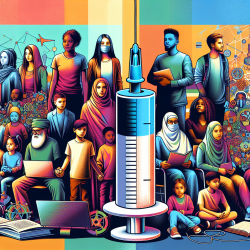Understanding Intersectional Human Rights in Vaccine Allocation
As practitioners dedicated to improving health outcomes, it's crucial to stay informed about the latest research and methodologies that can enhance our practice. One such approach is the intersectional human rights framework for vaccine allocation, particularly relevant in the context of the COVID-19 pandemic.
The Research: An Intersectional Human Rights Approach
The research paper titled "An intersectional human rights approach to prioritising access to COVID-19 vaccines" highlights the need for a vaccine allocation strategy that considers both medical and social vulnerabilities. This approach is aligned with international human rights laws, ensuring that vaccine distribution is equitable and just.
Key Principles of the Intersectional Approach
The intersectional approach emphasizes the importance of considering multiple axes of vulnerability, such as socioeconomic status, race, and health conditions, in vaccine allocation. This method ensures that those who are most at risk receive priority access, thereby addressing systemic health disparities.
Implementing the Approach in Practice
For practitioners, implementing this approach involves:
- Data-Driven Decisions: Use data to identify groups with overlapping vulnerabilities and prioritize them in vaccine distribution.
- Community Engagement: Involve community stakeholders in decision-making processes to ensure transparency and accountability.
- Policy Advocacy: Advocate for policies that incorporate intersectional frameworks to improve health equity.
Why This Matters for Children's Health
Children, particularly those from marginalized communities, are significantly affected by health inequities. By adopting an intersectional approach, we can better protect these vulnerable populations and ensure they have access to essential health services.
Encouraging Further Research
Practitioners are encouraged to delve deeper into this research to refine their understanding and application of intersectional approaches in health policy. Continuous learning and adaptation are key to improving health outcomes for all, especially in diverse educational settings.
To read the original research paper, please follow this link: An intersectional human rights approach to prioritising access to COVID-19 vaccines.










